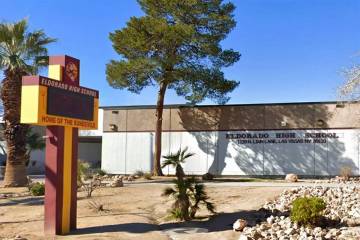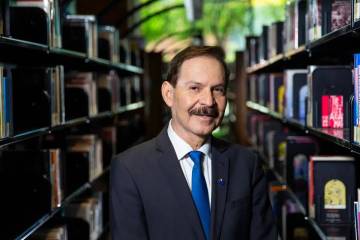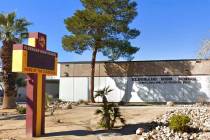New Nevada college advisory boards draw criticism
The Board of Regents last week created local advisory councils for the community colleges in the state, a move some education watchdogs fear is just window dressing to appease advocates who want local communities to have more say in the colleges.
The unanimously supported establishment of the Community College Institutional Advisory Councils on Friday comes in the wake of a heated battle to restructure the governance of higher education in the state.
In a showdown this summer, a panel of lawmakers rejected the idea of taking the community colleges out from under the Board of Regents.
Advocates argued the state needed a two-tier system that that would separate the University of Nevada, Las Vegas, the University of Nevada, Reno and the Desert Research Institute from the state’s two- and four-year colleges.
The concept was that community colleges should be rooted in their communities. Oversight and advocacy end up neglected when the colleges are bundled in with the universities, proponents of local control argued.
Although advocates lost the fight to dramatically change how education is governed, the Committee to Conduct an Interim Study Concerning Community Colleges recommended more community involvement was needed, and the Board of Regents’ creation of councils is a response to that wish.
The regents directed that by New Year’s Eve each community college must create a council made up of seven to 15 advisers who were chosen by Chancellor Dan Klaich, after consulting with the community college presidents and local stakeholders, and approved by regents Chairman Kevin Page.
The councils will meet quarterly. It’s unknown how much money they will have for an operating budget.
“The purpose of the local Institutional Advisory Councils is to ensure the linkage of the college to the community it serves and to anticipate future regional educational trends,” according to the charge of the councils as it was passed by regents.
No comments were made by the regents, who passed it swiftly.
Page, who collaborated with the city of North Las Vegas to come up with the council idea, said, “It’s an important step for workforce development. It lets us know what jobs are needed in the community. We will have a better understanding of what industries are growing.”
North Las Vegas Mayor John Lee partnered with CSN President Mike Richards to test such a board last year. That board met twice: Jan. 14 and April 21.
CSN spokeswoman K.C. Brekken said the board worked as a pilot model for the advisory councils.
Brekken said North Las Vegas board members provided valuable feedback in just a few meetings and helped the college start to identify pockets of the community, particularly in business, that don’t know about all that CSN has to offer.
An Oct. 16 email from Richards to this board indicates members did have one issue with the setup: They wanted more power.
Richards wrote that survey results and his communication with members indicated “members want the advisory board to have a more significant impact on college operations.”
Richards presented the regents’ creation of the advisory councils as an answer to that request.
Still, not everyone is so certain the board will be anything more than symbolic.
“It’s an old automobile with a new paint job,” said John Gwaltney, former president of Truckee Meadows Community College in Reno.
“They’re advisory boards. Advisory boards invariably turn into coffee and punch and cheese and crackers and go home.”
Carol Lucey, former president of Western Nevada College in Carson City, echoed that sentiment.
“I don’t think those will be effective,” Lucey said. “I had boards like that. They are not really the same as governance boards.”
Magdalena Martinez, director of education programs with The Lincy Institute, which recommended the split governance structure, was also concerned.
“You don’t have any real decision making,” Martinez said. “You’re not really shaping anything in a meaningful way.”
She questioned why members would be appointed by the chancellor and not the Board of Regents.
If these councils are going to be an arm of the governance structure then the members should be picked by elected officials, not the chancellor who is appointed by the Board of Regents, Martinez said.
Regent Allison Stephens said she was OK with the way appointments to the councils will be set up. “It makes sense,” as the presidents of the community colleges will have a say in who is appointed to the councils, she said.
Regent Cedric Crear said regents should allot some power to the chancellor.
“I trust the chancellor will pick the right people … a diverse group of individuals,” Crear said. “And I don’t just mean race, but people with diverse backgrounds. Business and community leaders.”
Crear said if he felt the councils were not so represented he would raise the issue at a later regents meeting.
Lucey said it didn’t matter if it was the chancellor or the Board of Regents picking people. Either way these types of committees wouldn’t be autonomous. Such boards should be appointed by legislators, she said.
Lucey said fantastic people devote time to those types of councils. The problem is those volunteers don’t have the authority they deserve and need to make real change for their communities, she said.
Randy Robison, who served on the North Las Vegas CSN board and has been recommended for the new CSN council, said his experience on the board was eye-opening, and he felt members were treated with respect.
Robison is the director of legislative affairs with Century Link and a former executive director of the Nevada Association of School Boards.
“I loved being on the board. I’m kind of an education junkie,” Robison said. “It was a thrill.”
The Board of Regents also created a new vice chancellor position to oversee community colleges that will be filled at a later date.
Contact Bethany Barnes at bbarnes@reviewjournal.com or 702-477-3861. Follow @betsbarnes on Twitter. Contact Francis McCabe at fmccabe@reviewjournal.com or 702-380-1039. Follow @fjmccabe on Twitter.
Who is on these advisory boards?
■ Business/industry representatives from the community
■ Local economic development and workforce organizations
■ Minority group representatives
■ Superintendent of schools or their designee
■ The community college (ex-officio)
■ The community college student leader (ex-officio)
LAS VEGAS REVIEW-JOURNAL




























